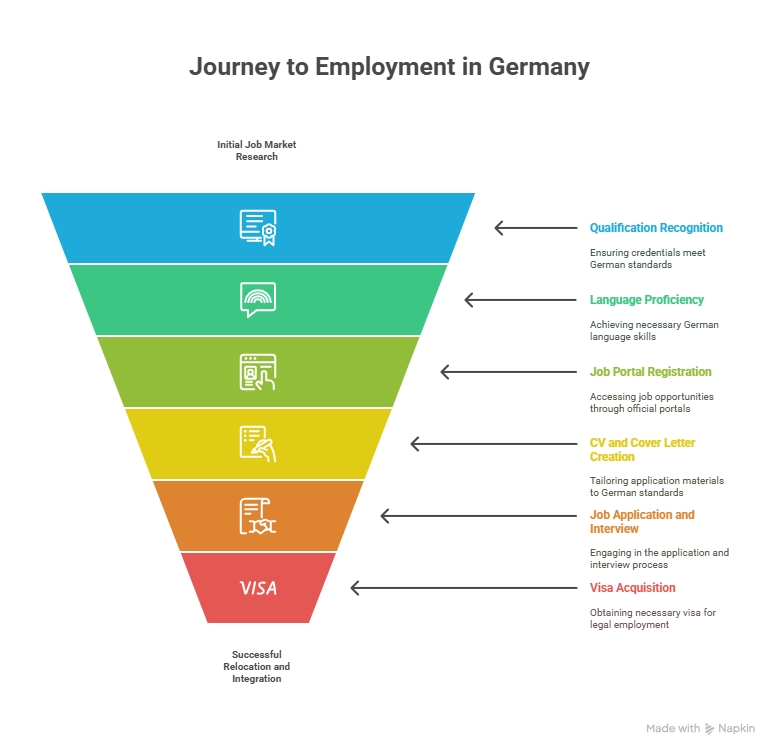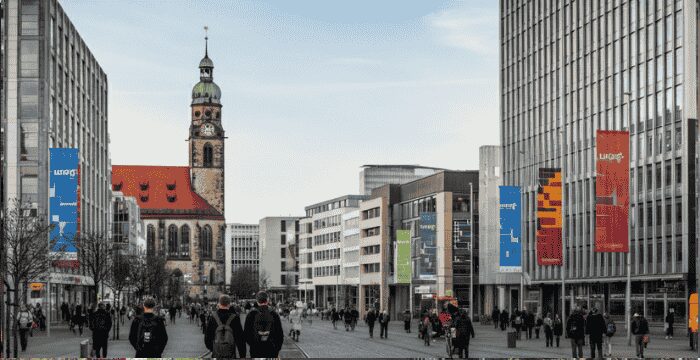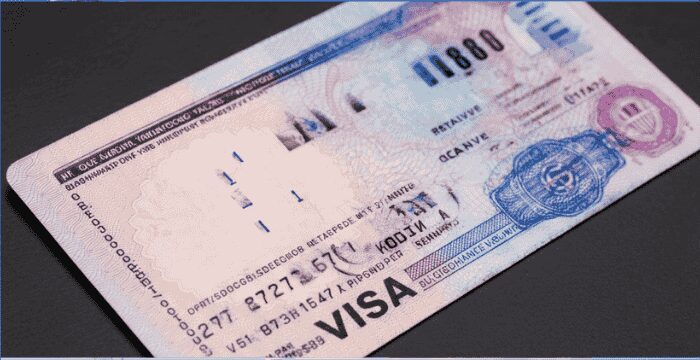Germany’s unemployment rate decreased to 3.3% in May 2024, marking one of the lowest rates in the EU. So, how to get a job in Germany from India? More than 46 million people are employed in Germany, and this number is increasing due to the growing demand for skilled international professionals. The German government’s “Make it in Germany” portal now offers a Quick Check tool for foreign applicants to assess their eligibility instantly.
The same four areas remain the primary employers of Indians, namely IT, engineering, healthcare, and finance, offering starting salaries ranging from 45,000 to 75,000 euros. In 2025, the EU Blue Card and Job Seeker Visa have made it easier for Indian applicants to process, with reduced waiting times. Nearly all German companies are conducting remote interviews and providing relocation assistance to Indian recruits.
German language proficiency at the B1 level is a commonly established prerequisite in most skilled vacancies, whereas the number of tech and MNC English-speaking vacancies is increasing. Indian professionals can now access the German government job portal in English, making job searches easier. Recent reforms in immigration have opened new avenues to permanent residency for skilled workers in India. The Indian population in Germany exceeds 200,000 and provides a strong support system for immigrants.
Dreaming of a high-paying, stable career in Europe’s strongest economy? Discover the proven steps, insider tips, and government-backed resources that can help you land your dream job in Germany—directly from India!
How to Get Job in Germany from India in 2025?
Learning how to get a job in Germany from India has become increasingly important as Germany faces a severe skilled worker shortage and actively recruits international talent. The opportunities to find a job are now higher than ever, as 137,500 Indian professionals already work in Germany, and this figure is expected to grow by 495 times since 2015. This guide will take you through the entire process, which entails learning about the German job market as an Indian and finding employment in Germany, all the way to securing the desired position.
The German government has also presented 30 new measures that explicitly make migration easier for Indian workers, such as the digitalisation of visas, and a shortened time period of issuance of visas to Indian workers (nine months to only two weeks). Whether you’re a recent graduate, an experienced professional, or looking to transition into a new career, this guide provides the roadmap you need to navigate the German employment landscape successfully.
Understanding the German Job Market for Indians 2025
2025 presents incredible opportunities in the German job market for Indians, driven by issues of population growth and economic expansion. Germany’s ageing population and low birth rate have created an urgent need for skilled workers, with an expected shortage of 7 million skilled professionals by 2035. This demographic shift has positioned India as Germany’s key partner for addressing workforce gaps.
Jobs in Germany for Indians have expanded significantly across multiple sectors. The unemployment rate among Indian professionals in Germany stands at just 3.7%, markedly lower than Germany’s overall rate of 7.1%. This figure demonstrates that Indian workers are highly employable and can effectively integrate into the German market.
The German government’s “Focus on India” plan has introduced several initiatives aimed at attracting Indian talent. These include increased outreach to Indian students already in Germany, teaching German to workers who intend to relocate, and simplification of visa access. It will be further reduced by the end of 2024, as visas will be digitalised, which means that the waiting time for visa approval will also be reduced.
| Indicator | Value | Year/Period |
| Indian professionals in Germany | 137,000 | 2024 |
| Growth rate (2015–2024) | 495% | 2015–2024 |
| Unemployment rate (Indians) | 3.7% | 2024 |
| Overall German unemployment rate | 7.1% | 2024 |
| Annual increase in Indian professionals | 23,000 | 2024 |
India has a strong bilateral economic relationship with Europe, particularly with Germany, which is a key factor behind the trend of working in Germany. Indian professionals are also being increasingly acknowledged by German companies for their technical skills and adaptability, particularly in areas such as IT, engineering, and the healthcare industry. The ability of more than 200,000 Indians to reside in Germany is also a source of strong support networks for the new arrivals, making the integration process very easy.
High-Demand Sectors & Best Jobs in Germany for Indians 2025
Top Industries Hiring Indians in Germany
- Jobs in Germany for Indians are concentrated in several high-demand sectors that offer excellent career prospects and competitive salaries. The IT industry is in a leading position and is expected to experience a 12 per cent increase in growth, generating high demand for software developers, data scientists, and cybersecurity professionals. German firms, in particular, appreciate Indian technicians for their knowledge of new technologies and their ability to speak English.
- Healthcare represents another significant opportunity area, with jobs set to rise by 15% due to Germany’s ageing population4. Doctors, nurses, and allied health workers in India have numerous opportunities, particularly in expatriate-dominated cities. Indian medical qualifications have been made easier to recognise, and therefore, medical professionals can be readily accepted in Germany.
- Engineering is one of the pillar sectors of Indian professionals in Germany. Mechanical, electrical, and civil engineers are in high demand, particularly in Germany’s automotive and manufacturing industries. The country’s focus on renewable energy and sustainability creates additional opportunities for environmental engineers and specialists in green technology.
| Industry | Growth Rate | Average Starting Salary | Key Roles |
| IT & Software | 12% | €55,000-€75,000 | Software Developer, Data Scientist |
| Healthcare | 15% | €45,000-€65,000 | Doctor, Nurse, Medical Technician |
| Engineering | 8% | €50,000-€70,000 | Mechanical, Electrical, Civil Engineer |
| Finance | 6% | €48,000-€68,000 | Financial Analyst, Risk Manager |
| Research | 10% | €45,000-€60,000 | Research Scientist, Academic |
Salary Expectations and Growth Opportunities in 2025
- Foreigners working in Germany are well-paid with a package that tends to surpass that of Indians. Indian professionals are generally paid between 45,000 (approximately 45,000 Euros or equivalent) and 75,000 (approximately 75,000 Euros or equivalent) per annum, depending on their sector and level of experience. In Germany, the average gross wage is 59,246 euros per annum, or 4,937 euros per month, and the net pay averages 2,850 euros per month (after taxes).
- The opportunities for career advancement are also immense, and within 3-5 years, many skilled Indian professionals in Germany can reach the top. The formal German company hierarchy provides well-defined promotion routes, and a focus on personal growth in a profession ensures a steady improvement of skills. The Indian professionals state that they are satisfied with the existence of a work-life balance and job security that is typical of the German employment system.
- The avenue to permanent residence is also easier, as skilled workers can apply to become permanent residents after working in Germany for a specified number of years. This job security helps make Germany a good choice for a career-oriented Indian professional seeking job security and development.
Step-by-Step Process: How to Get a Job in Germany from India in 2025?
Step 1: Research the Job Market
Understanding how to get a job in Germany from India begins with thorough market research. It is best to start by determining areas of high demand for your skills and qualifications. The German job search sites offer valuable insights into the existing opportunities and requirements of employers. Target those areas in which Indian professionals have been able to excel historically, i.e. in IT, engineering, healthcare and finance.
Study job descriptions to get an idea of what is typically asked, pay rates and desirable skills. Many positions require specific certifications or a particular language level. To gain an inside view of the job market and job applications in Germany, utilise professional networks such as LinkedIn job boards with Indians in Germany as members.
Step 2- Have Your Qualifications Accepted
Credential recognition is significant for Indian professionals in Germany who wish to work in regulated professions. The “Recognition in Germany” portal (www.anerkennung-in-deutschland.de) offers comprehensive guidance on recognising foreign qualifications. This is a compulsory process for healthcare professionals, engineers and teachers; other fields may involve voluntary recognition procedures.
The application timeframe is usually 3-4 months and requires translated documents, education certifications, and occasionally further examination. This process should be started at an early age, where most employers require a qualification before they can be considered for a job.
| Profession Type | Recognition Required | Processing Time | Additional Requirements |
| Healthcare | Mandatory | 3-4 months | Language test, adaptation course |
| Engineering | Recommended | 2-3 months | Professional experience proof |
| IT | Optional | 1-2 months | Portfolio demonstration |
| Teaching | Mandatory | 4-6 months | Pedagogical qualification |
| Finance | Optional | 2-3 months | Certification exams |
Step 3- Get to know the German Language
Language proficiency has a significant impact on your success in learning how to secure a job in Germany from India. There are English-speaking positions, especially those offered by multinational companies and startups in the technology field. Still, the level of German, as assessed by B1, has become a standard requirement in most high-skilled jobs. Knowledge of the German language, in addition to opening up job market opportunities, also facilitates the integration process at the workplace and in everyday life in Germany.
Several sources support the learning of the German language by Indian professionals. The Goethe Institute provides structured courses online and in cities across India. Apps like Babbel, Duolingo, and Busuu offer versatile learning options. A number of German firms have begun incorporating language lessons into their relocation assistance programs for Indian recruits.
Step 4 – Register on the German Government Job Portal & Other Platforms
The German government job portal serves as your primary gateway to official job opportunities. The “Make it in Germany” portal (www.make-it-in-germany.com) offers a comprehensive job exchange, a Quick-Check tool for eligibility assessment, and detailed information about living and working in Germany. Registration is free, and you gain access to thousands of validated job opportunities across multiple areas.
Beyond the official portal, consider leveraging popular German job search websites, including StepStone, Monster Germany, Indeed Germany, and XING (the German equivalent of LinkedIn). The features differ on each site, and there are also different networks of employers on each site; therefore, having a profile on several sites makes you more visible to potential employers.
| Job Portal | Specialization | Key Features | Registration |
| Make it in Germany | Government official | Visa guidance, Quick-Check | Free |
| StepStone | Professional roles | Salary insights, company reviews | Free |
| Monster Germany | All sectors | CV database, job alerts | Free |
| Indeed Germany | General employment | Company research, reviews | Free |
| Professional networking | Industry connections, events | Freemium |
Step 5: Create Your German Style CV & Cover Letter
German CV formatting differs significantly from Indian standards, and understanding these differences is crucial for getting a job in Germany from India. German CVs (Lebenslauf) are typically 2-3 pages long, include a professional photo, and follow a specific chronological format. Information about the individual that needs to be provided is voluntary, but it typically includes personal details such as marital status and nationality.
The cover letter (Anschreiben) should be one page in length, addressing the specific position and company. German employers emphasise precision, hence making every application according to the job requirements. One should not use a generic application; instead, they should be personal and of high quality, with thorough research and genuine interest shown in the position and the company.
Step 6 – Applying to Jobs and Preparing for Interviews
This is because the German job application process has changed and evolved to accommodate international applicants, and most firms are now willing to conduct remote interviews with Indian applicants. Interviews in Germany are often formal and rigid, as they focus on technical skills, a good fit with the company, and a commitment to the job over the long term.
Be prepared to answer typical questions about your reasons for working in Germany, your knowledge of German workplace culture, and your integration strategies. Practical tests or case studies may be involved in technical interviews. Study the company, learn their values and recent changes and come up with some insightful questions about the job and the company.
Step 7: Find a Job Proposal, Obtain a Visa
The process of getting the work permit in Germany commences after you get a job offer. The common types of visas available to Indian skilled professionals are the EU Blue Card, which is open to highly qualified employees, the standard work permit, and the Job Seeker Visa, which is open to those who have yet to secure a job. The EU Blue Card is the quickest way to attain permanent residence, and anyone who is a university graduate and has secured a job offer with a salary threshold can apply.
Some of the documentation that you will need includes your passport, educational certificates, job offer letter, qualification proofs and health insurance. The process of Germany’s immigration for Indians has been simplified, and most applications are processed within 2-4 weeks.
| Visa Type | Eligibility | Processing Time | Validity |
| EU Blue Card | University degree, €45,552+ salary | 2-4 weeks | 4 years |
| Work Permit | Job offer, recognised qualifications | 4-6 weeks | 2-4 years |
| Job Seeker Visa | University degree, financial proof | 4-6 weeks | 6 months |
Step 8: Relocation & Integration in Germany
Effective relocation means functional arrangement and adjustment to the new culture. Look for safe housing in advance, as the German housing market can be highly competitive. Health insurance is also compulsory and must be organised before commencing work. A great majority of employers offer relocation packages that include temporary housing and office facilities.
Familiarity with local customs, business etiquette, and social norms is beneficial for assimilation into German society. The Indian community in Germany is substantial and provides a Wealth of support networks. Indian associations and cultural groups can be found in major cities. Knowledge of German work culture, which entails strict adherence to punctuality, a direct communication style, and a structured approach to tasks, facilitates professional integration into the domain.
Using the German Government Job Portal: Your Gateway to Jobs in Germany in 2025
How to Register and Search for Jobs
The German government job portal provides the most reliable pathway for Indian expats in Germany seeking employment opportunities. Registration on the “Make it in Germany” portal requires basic personal information, educational background, and details of professional experience. The platform’s Quick-Check tool immediately assesses your eligibility for various visa categories and provides personalised recommendations.
Job search offers the possibility of searching based on location, sector, pay scale, and language. Create a job alert with your desired requirements to receive notifications about new vacancies. The portal also provides more company profiles, which help you research potential employers, including their hiring practices and company culture.
Tips for Maximising Success on the Portal
Optimising your profile on the German government job portal significantly improves your visibility to employers. Fill in your profile completely and create a professional summary, personal experience, and evaluation of skills. Submit a German-style CV, ensuring all information is up-to-date.
Regular profile updates and active engagement with the platform’s resources demonstrate your commitment to getting a job in Germany from India. Attend job fairs and webinars that are available virtually on the portal. Such events provide employers with a firsthand experience and insight into hiring standards and industry trends.
| Portal Feature | Benefit | Usage Tip |
| Quick-Check Tool | Visa eligibility assessment | Complete honesty for accurate results |
| Job Alerts | Automatic notifications | Set multiple alerts for different criteria |
| Company Profiles | Employer research | Study before applications |
| Virtual Events | Direct employer contact | Prepare an elevator pitch |
| Resource Library | Immigration guidance | Review visa requirements |
Visa Options for Indian Professionals 2025: Work Permit, EU Blue Card & Job Seeker Visa
Germany Work Permit
The standard work permit remains a primary option for Indian professionals in Germany who don’t qualify for the EU Blue Card. This permit requires secured employment with a German employer and a validated qualification related to the occupation. The employer must prove that they have not found any EU citizen willing to take the position, but this is not a requirement when it comes to shortage occupations.
The turnaround time for processing work permits typically ranges from 4 to 6 weeks, and a work permit will usually be issued within the same period as the employment contract, which can last up to 4 years in the initial phases. It can be renewed, and after five years of continuous residence, holders may be given the opportunity to obtain permanent residency.
EU Blue Card
The EU Blue Card is a high-quality visa within Germany that supports highly skilled workers of Indian origin. Applicants must hold a university degree and secure a job offer with a minimum annual salary of €45,552 (€41,041.80 for shortage occupations, such as IT, engineering, and healthcare). The Blue Card also provides fast-track permanent residence following only 21 months of B1 German language proficiency or 33 months without.
Blue Card holders gain improved mobility in the EU and can bring their relatives to Germany immediately. The card has a maximum validity of four years and can be renewed provided continuous employment is maintained.
Job Seeker Visa
The Job Seeker Visa offers a strategic opportunity for skilled Indians to seek employment in Germany. The visa is valid for 6 months, during which time holders can attend interviews, network with employers, and experience the German work culture. Applicants must hold a university degree, demonstrate financial resources (approximately €5,000), and have relevant professional experience.
The Job Seeker Visa is not extendable, but a holder can change to either a work permit or the EU Blue Card when they find a job. Such a visa is beneficial to individuals who work in a competitive field and rely on personal face-to-face networking and direct contact with their employer.
| Criteria | Work Permit | EU Blue Card | Job Seeker Visa |
| Job Offer Required | Yes | Yes | No |
| Minimum Salary | No requirement | €45,552 | N/A |
| Validity | Up to 4 years | Up to 4 years | 6 months |
| Family Inclusion | After 1 year | Immediate | No |
| Permanent Residency | After 5 years | After 21-33 months | N/A |
Jobs in Germany for Indians in 2025: Freshers, Experienced & Students
Jobs for Freshers
Fresh graduates from India exploring how to secure a job in Germany face unique challenges and opportunities. You may find entry-level jobs in most kinds of sectors, but competition is rather intense. The German employers appreciate systematic thinking, technical expertise, and cultural flexibility among fresh graduates. Most companies offer graduate trainee schemes tailored for international applicants.
The use of language skills becomes especially vital to freshers, who may not have substantial work experience to compensate for communication gaps. Internships and working student jobs are excellent at introducing one to the German job market, where one gains work experience and valuable contacts.
| Opportunity | Typical Salary Range | Key Requirements |
| Graduate Trainee Programs | €35,000–€45,000 | University degree, German B1 |
| Junior Developer | €40,000–€55,000 | Technical skills, portfolio |
| Research Assistant | €30,000–€40,000 | Academic background, language skills |
| Marketing Coordinator | €35,000–€48,000 | Communication skills, creativity |
Opportunities for Experienced Professionals
Experienced professionals have significant advantages when learning how to get a job in Germany from India. Intermediate and top jobs are better paid, and they allow for easier integration into the German business culture. More qualified candidates have an advantage of using their previous record to put forward more terms, and they also show results to potential German employers.
At the senior level, networking can be critical, and professional associations, industry events, and executive search firms can be highly effective in placing job opportunities. Many Indian managers with extensive work experience easily become leaders of German businesses, are involved in strategic decisions, and contribute to the development of international business.
How to Get a Job in Germany from India in 2025
Indian students studying in Germany have exclusive benefits during the job hunt process. The job opportunities that offer part-time work during the studies are hands-on experiences and language practice. After graduation, students are allowed to overstay by 18 months to seek employment, which provides them with sufficient time to find suitable job opportunities.
University career services, professor-industry contacts, and peer networks are beneficial to student job seekers. Many universities in Germany are actively sought after by companies, and graduates are often guaranteed jobs immediately after completing their education. A German education qualification combined with Indian nationality makes the candidate a strong candidate in front of employers who want to attract diverse, internationally oriented professionals.
Common Challenges & Solutions for Indian Job Seekers in Germany in 2025
Language Barriers
Language challenges represent the most common obstacle for Indians learning how to get a job in Germany. While knowledge of the English language unlocks opportunities in multinational corporations and technological startups, knowledge of the German language broadens the field of opportunities. It facilitates the integration process in the workplace. Most professionals in India undervalue the importance of local language proficiency in establishing contacts and advancing their careers.
Some of the solutions include intensive German courses before arrival, language exchange programs with German speakers and immersion by consuming German media. Most employers are currently providing language training as a component of their onboarding processes, and the value of language development for employees is being recognised as an investment.
Adapting to German Work Culture
Indian people need to adapt their cultural norms and adopt new ones to succeed in Germany. The business culture of the Germans is characterised by directness, a strong emphasis on work-life balance, a structured process, and punctuality. Indian professionals can feel that the communication style is harsh or the hierarchy nis ot as easy as they might want it to be.
Effective adjustment entails identifying workplace dynamics, soliciting feedback, and gradually changing communication styles. German counterparts prefer to conduct business with professionalism, reliability, and competence over personal relationships. Being aware of such cultural nuances will expedite the process of professional integration and career growth.
| Cultural Aspect | German Expectation | Adaptation Strategy |
| Punctuality | Arrive 5-10 minutes early | Plan extra travel time |
| Communication | Direct, factual | Practice clear, concise expression |
| Hierarchy | Respect but question constructively | Understand decision-making processes |
| Work-Life Balance | Respect personal time | Avoid after-hours communication |
Navigating Rejection & Building Resilience
Job search rejection is common when learning how to secure a job in Germany from India, particularly during the initial application process. German employers are strict in their expectations and can disqualify candidates based on relatively trivial issues, such as a formatting mistake in the CV or a lack of information about the company.
Some of the traits of building resilience include viewing every rejection as a learning opportunity and requesting feedback where available, as well as continually refining applications and interviewing techniques. The Indian community in Germany provides excellent support arrangements, and most professionals are willing to offer valuable tips and share their experiences. Sustenance and increased performance typically lead to success within 6-12 months of effective job hunting.
Dos and Don’ts When Applying for Jobs in Germany from India in 2025
Dos
Customise every application when pursuing jobs in Germany for Indians. German employers require a personal application; an employee should show interest in the company and the job. Research the company, learn about their values and recent developments, and tailor the CV and cover letter to match the company’s culture. Generic applications are often an instant turn-off and are usually disregarded.
Be an active networker in your industry and within the broader German-Indian professional community. Attend online networking meetings, professional organisations, and LinkedIn groups within your industry. Most jobs are filled through word of mouth and industry contacts, rather than through ads.
Get ready to excel in interviews by learning about the German culture of interview questions and expectations. Train to describe your reasons to work in Germany, your knowledge of the position and your future career. Prepare specific examples that demonstrate your skills and achievements using the STAR method (Situation, Task, Action, Result).
Don’ts
Don’t submit generic CVs when applying for jobs in Germany as an Indian. It is simple to spot template applications by German employers, and they may treat them as a sign of a lack of interest or effort. Every application must demonstrate research on the company and the position, and it should be supported by relevant experience and skills.
Don’t ignore language requirements listed in job postings. If German proficiency is mentioned, ensure you reach the same level before submitting your application. Exaggerating your language skills may create awkward interview moments and lead to instant elimination. Do not overpromise yourself; simply state your current position. Show that you are determined to succeed.
Don’t overlook visa deadlines and requirements when learning how to get a job in Germany from India. A visa application should be submitted as soon as a job offer is received, as the processing time can vary. Ensure that all materials are translated and duly certified, as incomplete applications will significantly delay the process.
| Application Element | Do | Don’t |
| CV Format | Use the German standard format | Submit Indian/US format |
| Cover Letter | Address specific role requirements | Use generic templates |
| Language Skills | Be honest about proficiency | Overstate abilities |
| Follow-up | Send a polite follow-up after 2 weeks | Bombard with daily emails |
| Interview Preparation | Research the company thoroughly | Wing it without preparation |
Latest Success Stories and Case Studies
Real-world examples illustrate successful strategies for securing a job in Germany from India. Bangalore-born software engineer Priya Sharma landed a job at SAP in Walldorf by studying German and earning the necessary certifications before applying. The active approach to cultural preparation and the development of technical skills worked out well and pleased the employer, who integrated quickly.
Rajesh Kumar, a mechanical engineer from Mumbai, leveraged his experience in automotive manufacturing to join BMW’s facility in Munich. He did this by connecting with other Indian professionals who were already employed in German Automotive firms and got his Indian engineering qualifications recognised before seeking employment. This preparation enabled him to negotiate for a senior position with favourable compensation.
Dr. Anita Patel’s journey from practising medicine in Delhi to working as a cardiologist in Hamburg demonstrates the importance of early credential recognition and language preparation. She has spent two years learning the German language and certifying her medical qualifications before moving, and thus she was able to integrate into the German healthcare system immediately.
What emerges from these success stories is that, in many cases, they are prepared, having had to adapt to a new culture, network effectively, and persist. Both professionals took their time to figure out how to be the PACE professionals seeking to learn what Germans demand and expect, after which they made the move.
Future Outlook and Trends in 2025
The future of Indian professionals in Germany is exceptionally bright, even in the years to come, up to 2025 and beyond. Germany’s demographic challenges will continue to drive demand for skilled international workers, with a particular emphasis on the technology, healthcare, and engineering sectors. The government’s commitment to streamlining immigration processes for Indian professionals indicates long-term strategic partnership development.
The new trends will involve increased flexibility in remote work, digital processing of visas, and enhanced support services for integration. Companies in Germany are investing in diversity and inclusion efforts, where international perspectives should be valued in global business settings. The increasing Indian population yields rising support systems and cultural bridges to newcomers.
The new opportunities for Indian skilled workers in Germany will be generated by the technological industry development, the development of renewable energy, and the modernisation of the healthcare system. The focus on sustainability and the trend towards digital transformation align well with India’s emphasis on education and professional skills.
Conclusion
Learning how to get job in Germany from India requires strategic planning, cultural preparation, and persistent effort, but the rewards justify the investment. Germany’s strong economy, excellent work-life balance, comprehensive social benefits, and clear path to permanent residency make it an attractive destination for Indian professionals seeking international career opportunities. Success mainly depends on the quality of preparation, including knowledge of the job market, recognition of qualifications, proficiency in German, and understanding of local business culture. The German government job portal and other official resources provide reliable pathways to employment, while the growing Indian professional community offers valuable support and networking opportunities.
With Germany actively seeking skilled international workers and implementing policies to facilitate Indian immigration, the timing has never been better for qualified professionals to pursue job opportunities in Germany. Begin the preparation process today by investigating the industry you wish to work in, learning German and networking with the Indian professional group within Germany. India to German employment success is not an easy path, and it needs commitment and tolerance, and thousands of Indian professionals have achieved this change. Your German career adventure starts here and now. Just begin by going through the resources and strategies discussed in our detailed guide.
FAQs( Frequently Asked Questions)
Q1: What is the eligibility for jobs in Germany for Indians?
Ans. Eligibility for jobs in Germany for Indians depends on several factors, including educational qualifications, professional experience, language skills, and the specific role requirements. Generally, you need a recognised university degree, relevant work experience, and basic German language proficiency (B1 level for most positions). English proficiency in multinational companies may be acceptable in some sectors, such as IT and engineering. In professions that have been regulated, such as healthcare, teaching, and engineering, you will need to acquire recognition of your Indian qualifications by going through the official recognition process. The German work permit procedure also requires a clear criminal record and sufficient funds to sustain yourself at the start.
Q2: What are the ways of applying for German jobs in India?
Ans. To apply for jobs in Germany as an Indian, start by registering on the German government’s job portal, “Make it in Germany,” and other popular job platforms, such as StepStone, Monster Germany, and LinkedIn. Create a German-style CV that includes a professional photograph and work experience. Make each application tailored to the specific job and company. German employers typically require job applicants to apply online through company websites or dedicated job portals, providing a CV, cover letter, and relevant certificates. Many German companies now conduct remote interviews for international candidates, making it easier for candidates from India to secure a job in Germany without requiring initial travel.
Q3: Does one have to know the German language to work in Germany?
Ans. The language requirement in German varies by industry and company type. Although B1-level proficiency in German is now the norm in most jobs, English-speaking employees are welcomed by a considerable number of multinational businesses and technology startups. However, the German language is an excellent addition to your job prospects and workplace integration. Indian professionals in Germany who aspire to a long-term career in the country should consider learning the German language. Most employers offer language training during the onboarding period, as they realise the financial benefits of training their employees.
Q4: Which are the top job board websites to find jobs in Germany in case of Indians?
Ans. The German government’s job portal, “Make it in Germany,” serves as the primary official resource, offering verified job listings and comprehensive immigration guidance. Other quality websites include StepStone, which offers professional jobs, Monster Germany, which features a variety of jobs, Indeed Germany for general job listings, and XING for professional networking. LinkedIn remains a valuable resource for networking and establishing direct contact with employers. Most Indian expats in Germany advise keeping profiles on various platforms to maximise visibility.
Q5: What is the processing time for a work Visa for Germany in India?
Ans. The processing time for the German work permit has also improved dramatically, and now most applications are completed within 2-4 weeks for EU Blue Card holders and 4-6 weeks when the standard work permit is applied. The German government’s streamlined procedures for Indian applicants have reduced processing times from the previous 9 months to as little as 2 weeks in many cases.









